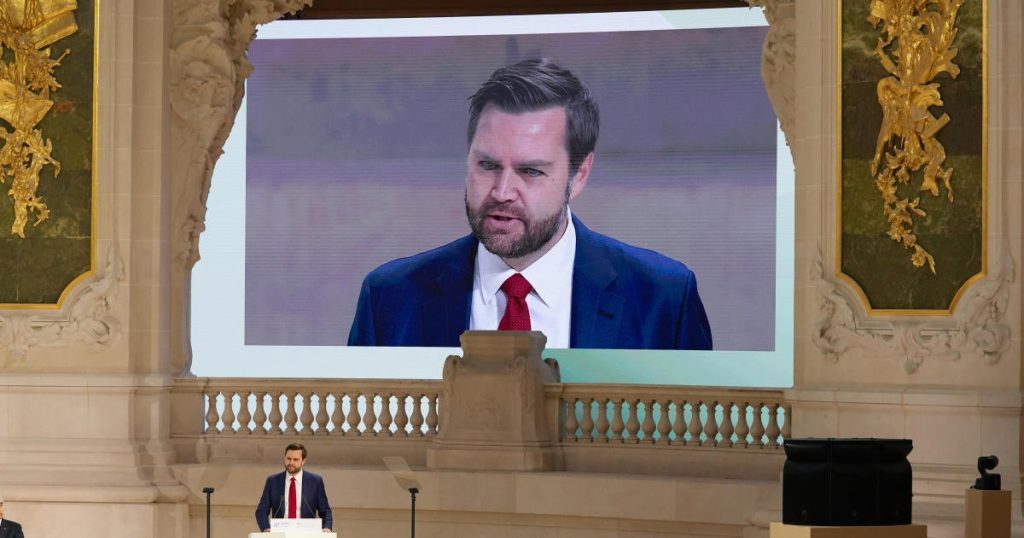A Warning Against Overregulation: Europe and the Digital Services Act
In a significant international address, Vice President JD Vance issued a stark warning to European Union countries about the dangers of overregulating the tech industry, particularly in the realm of artificial intelligence (AI). Speaking at the Artificial Intelligence Action Summit in Paris, Vance emphasized the Trump administration’s concern over reports suggesting that some foreign governments are contemplating stricter regulations on U.S. tech companies operating internationally. He asserted that such measures would be detrimental not only to the United States but also to the EU nations themselves. Vance specifically criticized the EU’s Digital Services Act, arguing that while protecting children from online predators is crucial, the regulation goes too far by policing so-called misinformation, thereby restricting adult access to diverse opinions.
The Trump Administration’s Vision for AI: Freedom and Growth
The Trump administration’s stance on AI, as articulated by Vice President Vance, centers on the belief that AI should remain free from ideological bias and thrive in an environment unhindered by excessive regulation. Vance underscored the administration’s commitment to promoting pro-growth AI policies, aimed at fostering innovation and ensuring the U.S. maintains its leadership in the tech sector. He called for a deregulatory approach to AI development, encouraging conference participants to embrace this philosophy. This vision aligns with the broader "America-first" strategy, positioning the U.S. as a pioneer in AI advancement and a key partner for foreign nations seeking to leverage this transformative technology.
A Call for Deregulation: Echoing Macron’s Push for Innovation
Vance’s advocacy for a deregulatory environment resonated with French President Emmanuel Macron’s stance, who has been urging the EU to create a more favorable climate for AI innovation. Macron highlighted France’s capacity to generate sufficient clean energy to support AI development, contrasting this with President Trump’s "drill, baby, drill" approach to fossil fuels. Macron’s metaphor of "plug, baby, plug" underscored Europe’s potential to lead in sustainable AI. While the summit aimed to establish ethical AI standards, Macron’s emphasis on innovation suggested a recognition that deregulation is essential for fostering progress in the AI sector.
The Global AI Race: Summit’s True Agenda
Although the summit, co-hosted by Macron and Indian Prime Minister Narendra Modi, was ostensibly focused on sustainable AI standards, it was overshadowed by the intense global competition to dominate the AI landscape. Major tech leaders like Google’s Sundar Pichai and OpenAI’s Sam Altman attended, reflecting the industry’s critical role in shaping the future of AI. The presence of Chinese Vice Premier Zhang Guoqing added another layer to the race, highlighting the geopolitical dimensions of AI development. Vance’s address, while not explicitly mentioning China, addressed concerns about "hostile foreign adversaries" misusing AI for surveillance and censorship, signaling the administration’s resolve to counter such threats.
Defending American Interests: Vance’s Strong Message
Vice President Vance delivered a robust message regarding the protection of American interests in AI, vowing to safeguard U.S. technologies from theft and misuse. He pledged to collaborate with international allies to strengthen these protections and prevent adversaries from acquiring AI capabilities that could endanger global security. Vance emphasized that the U.S. would remain the preferred partner for foreign nations in AI development, underscoring the administration’s commitment to maintaining technological leadership. His remarks served as a clear warning to potential adversaries, asserting that the U.S. would not tolerate any erosion of its competitive edge in AI.
A Cautionary Note to Allies: Beware of Authoritarian Partnerships
In a concluding note, Vance cautioned international allies against forming partnerships with authoritarian regimes, warning that such collaborations rarely yield long-term benefits. Drawing parallels to past experiences with subsidized tech from these regimes, he highlighted the hidden costs and risks associated with such deals, such as compromised security and ethical standards. Vance’s message was clear: while cheaper technology might offer short-term gains, the long-term consequences of supporting authoritarian regimes far outweigh any immediate advantages. This warning reflected the administration’s broader strategy of urging allies to align with democratic values in their technological collaborations, ensuring a united front against adversarial forces in the AI race.












